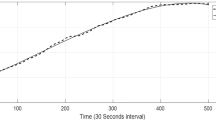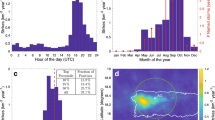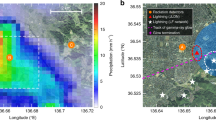Abstract
IN the course of the ionospheric observations carried out at Calcutta (lat. 22° 33′ N., long. 88° 21′ E.) for more than two decades, it had always been found that sporadic E ionization (E s) is greatly increased during the occurrence of thunderstorms. In view of the persistence of the phenomenon, it was thought worth while to make a close.study of the increase of E s ionization during the occurrence of severe thunderstorms of the squall type, known as ‘nor’westers', which are a special feature of the weather of this part of India (Bengal) in the pre-monsoon months March–May. During these thunderstorms the wind generally blows from a north-westerly direction with velocity often exceeding 50 miles/hr. The thunderstorms are invariably accompanied by lightning discharges.
This is a preview of subscription content, access via your institution
Access options
Subscribe to this journal
Receive 51 print issues and online access
$199.00 per year
only $3.90 per issue
Buy this article
- Purchase on Springer Link
- Instant access to full article PDF
Prices may be subject to local taxes which are calculated during checkout
Similar content being viewed by others
Author information
Authors and Affiliations
Rights and permissions
About this article
Cite this article
MITRA, S., KUNDU, M. Thunderstorms and Sporadic E Ionization of the Ionosphere. Nature 174, 798–799 (1954). https://doi.org/10.1038/174798b0
Issue Date:
DOI: https://doi.org/10.1038/174798b0
This article is cited by
Comments
By submitting a comment you agree to abide by our Terms and Community Guidelines. If you find something abusive or that does not comply with our terms or guidelines please flag it as inappropriate.



